Charles Ornstein contributed reporting.
How to Use the Updated “Nursing Home Inspect” Database
Our “Nursing Home Inspect” tool is now easier to use. Here’s what you can find when searching our database by state, county or facility.
“Nursing Home Inspect” makes it fast and easy to search thousands of recent government inspection reports, find information about specific nursing homes and discover new serious issues found by inspectors. Below are some tips to help you make the most of our database.
First, a little background.
Nursing homes receiving Medicare and Medicaid funding are subject to inspections to determine whether they are meeting requirements related to medical care, resident rights and safety. The facilities are inspected both routinely and when the government receives a complaint about a home. A nursing home’s failure to meet any of these requirements is called a “deficiency” and is documented in an inspection report.
These inspection reports and other nursing home data are compiled by the Centers for Medicare and Medicaid Services, which runs a site called Nursing Home Care Compare. Unlike the agency’s site, however, “Nursing Home Inspect” offers an advanced search function that allows you to search across all the reports at once. Also unlike CMS, our app allows searches by keywords, date ranges, states or territories, deficiency seriousness, report types and deficiency categories. So, for example, you can limit your search to finding any nursing home in Louisiana or Texas where inspectors documented serious deficiencies involving choking. Our app also provides summaries of the reports on each nursing home’s page to make them easier to digest.
As of today, the underlying database covers nearly 400,000 deficiencies from over 90,000 reports at over 15,000 homes. It is updated monthly to include new data and deficiencies. In addition to allowing you to search reports, the database also provides other information about nursing homes, including fines, whether the home is for-profit or nonprofit, staffing and capacity information, and COVID-19 vaccination information.
Understanding Inspection ReportsAll deficiencies in a report have a seriousness score between A and L. These scores are assigned by government inspectors, not ProPublica. Scores are a combination of scope, or how widespread a problem is, and severity, or the level of harm inflicted. Broadly speaking, A is the least serious and L is the most serious. Letters J, K and L indicate residents were in “immediate jeopardy,” meaning they were at risk of serious injury, harm, impairment or death.
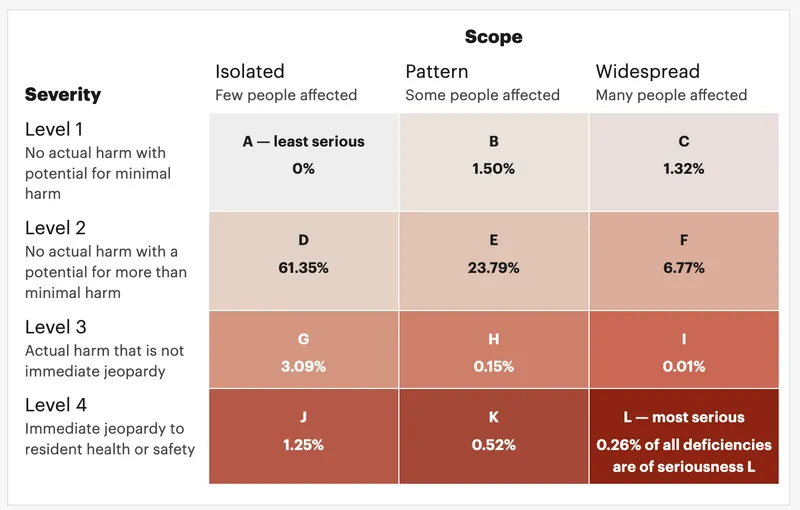
Inspection reports only focus on problems, not on whether residents get excellent care, so they should be used alongside other information such as staffing and ownership when assessing a home’s overall performance. Experts recommend that family members visit a home and see it for themselves before making decisions about where to place a loved one. Almost all nursing homes have been cited for some deficiencies, so citations are not necessarily an indication that a home is subpar.
On the flip side, the government isn’t aware of all problems in nursing homes, and some homes have not been inspected recently. If a home has not had a standard inspection in more than two years, it will have an “inspections delayed” flag at the top of its page. A home without recent reports may have undiscovered issues.
Find Homes Near YouProPublica has redesigned its search experience to make finding nursing homes easier. When you type a word into search, it will auto-populate with relevant nursing homes, states and counties.
If you do not see the result you are looking for, you can narrow your search by choosing the type of result in the dropdown next to the search bar. For instance, if you are looking for a county, you can change the dropdown to “counties.”
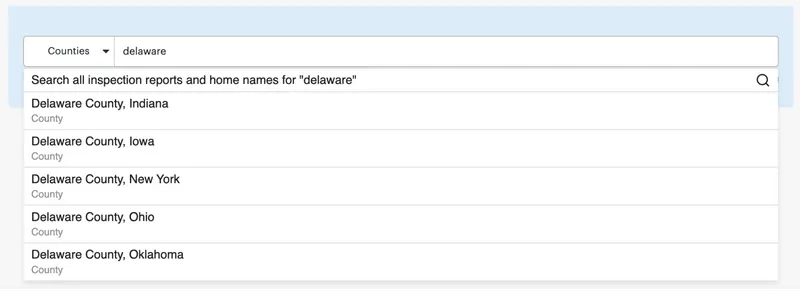
If you do not see the search term you are looking for, you can select “Search all inspection reports and home names for …” or hit enter to view all results. Select the “homes” tab to see a list of homes with names that match your search. For instance, you can search for all homes with “view” in their name.
You can also go to a state, territory or county page and explore all homes in the area. For instance, if you are interested in homes near Chicago, you can go to the Cook County page or the Illinois state page. You can sort by lowest deficiency count or lowest total fines to find homes that haven’t been cited frequently.
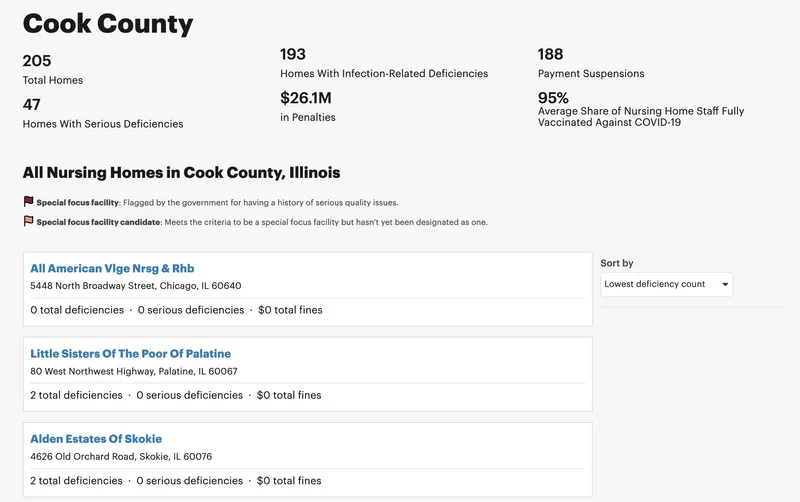
To make it easier to identify important characteristics of a home, a nursing home’s page may have one of several flags at the top. These show status indicators like whether the home is a “special focus facility,” meaning it has been cited by the government for having a history of serious quality issues; whether a home is behind on its inspections, meaning it hasn’t had a standard inspection in over two years; whether its staff vaccination rate is well below the state average; and whether the facility’s ownership has changed in the last 12 months.
Every page also has summary data about the home, including staffing levels, capacity information, and whether the home is for-profit or nonprofit.
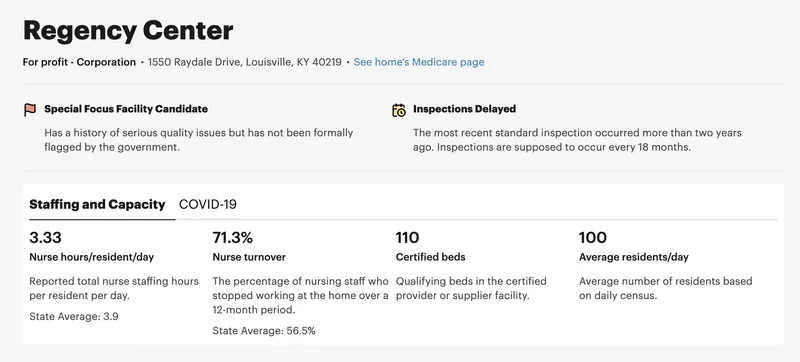
If you’re looking for detailed information about a nursing home’s inspection history, there’s a section on each home’s page where you can review the last three inspection cycles (roughly 12-18 months each) and the last three years of complaint or infection reports.
Each report tells you the number of deficiencies found in the inspection, as well as the date of the report. To see more information about each deficiency, click the “read more” button to see the category, description and seriousness of each issue found.
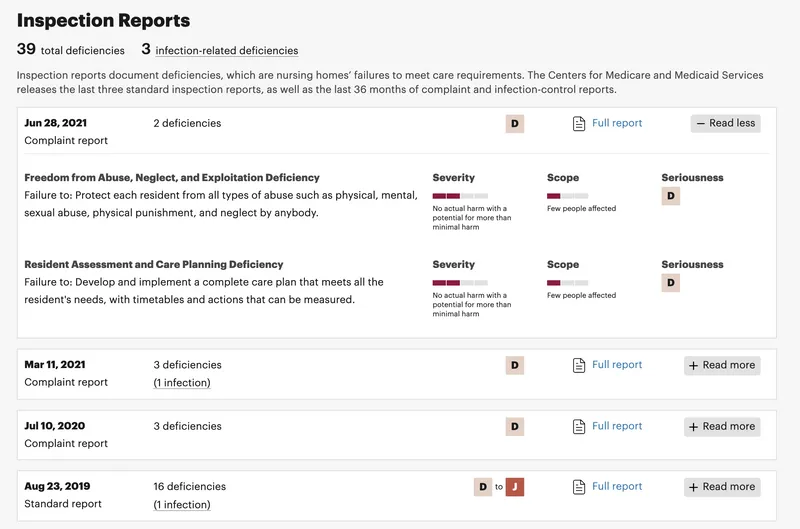
To make it easier to identify recent, serious problems in homes, ProPublica added a section for each state to highlight the most recent deficiencies that were categorized as putting residents in immediate jeopardy. These provide information on the type of deficiency and the home it occurred in, and they allow you to go to the report summary to view more information. Smaller states or states that are delayed on their inspections may not have any serious deficiencies in the last few months.

Our search engine looks through the narrative portion of the inspection reports — the part where inspectors describe conditions in the home and any deficiencies they have discovered. This is where you can find the most details about problems reported in a nursing home. Conducting an advanced search allows you to narrow down your results or combine multiple search parameters.
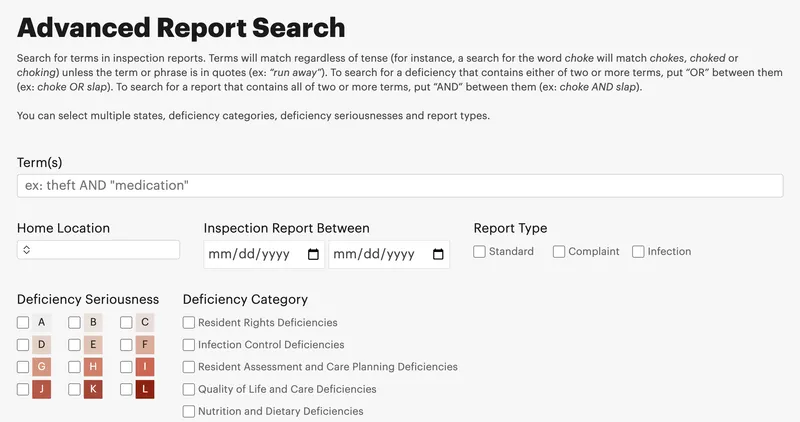
Our search engine supports basic word stemming, meaning a search for the term elope will also produce results for elopes, eloping and so on. If you want to search for an exact term or phrase, put the words in quotation marks. For instance, if you want to search for medication, but not medicate or medicating, search for “medication”.
Advanced search also supports searching for multiple terms simultaneously. For example, if you want to search for reports that contain either theft or steal, you can enter theft OR steal and see results for deficiencies that contain either term. If you want to search for reports with both theft and steal in them, a search for theft AND steal will produce only deficiencies that contain both words.
You can also build more advanced queries. For example, (“theft” AND “steal”) OR rob will produce deficiencies reports that contain either both the words theft and steal exactly, or any version or the word rob (robbing, robbed, etc.).
FiltersThe advanced search feature allows you to narrow your search by several criteria, including searching across multiple states, deficiency seriousness scores, deficiency categories and report types (standard reports, reports stemming from a complaint or infection reports) simultaneously.
Users can also search reports in a specific date range. For instance, if you are only interested in reports filed during the first six months of the COVID-19 pandemic, you can filter for reports dated between 3/11/2020 and 9/11/2020.
Term TipsInspectors may write up their reports differently. Try several search terms to be sure you’re getting the most complete results. For example, take a common problem like bedsores, which can develop if a resident is confined to bed and staff do not turn the person often enough.
Searching for the phrase “pressure sore” returns 2,318 reports. Searching for the word “bedsore” returns 84 results. Searching for the phrase “pressure ulcer” returns 14,018 results. But other words that also can return deficiencies related to bedsores include: decubitus, purulent and pus, as well as Stage III and Stage IV (phrases that describe the most serious and dangerous sores, but can also describe cancer progression). A search for “bedsore” OR “pressure sore” OR “decubitus” OR “purulent” OR “pus” or “pressure ulcer” returns 15,075 total results.
Some other searches that piqued our interest were: cigarette AND burn (found patients who were burned when allowed to smoke without supervision); conviction (found nursing home staff with criminal records); ignore OR mistreat OR rude (found residents who believed that staff had been unkind or neglectful).
A search for the words terminate OR suspend often produces results involving nursing home staff who were disciplined for alleged misconduct.
In the advanced search, you can also filter by deficiency categories such as “Quality of Life and Care Deficiencies” or “Freedom from Abuse, Neglect, and Exploitation Deficiencies.”
Understanding Search ResultsWhen you search for a keyword, our app only returns the number of deficiencies that match the search criteria, not the overall number of deficiencies cited in each report. To count total deficiencies for a home or a specific report, you can visit the home’s page in “Nursing Home Inspect.”
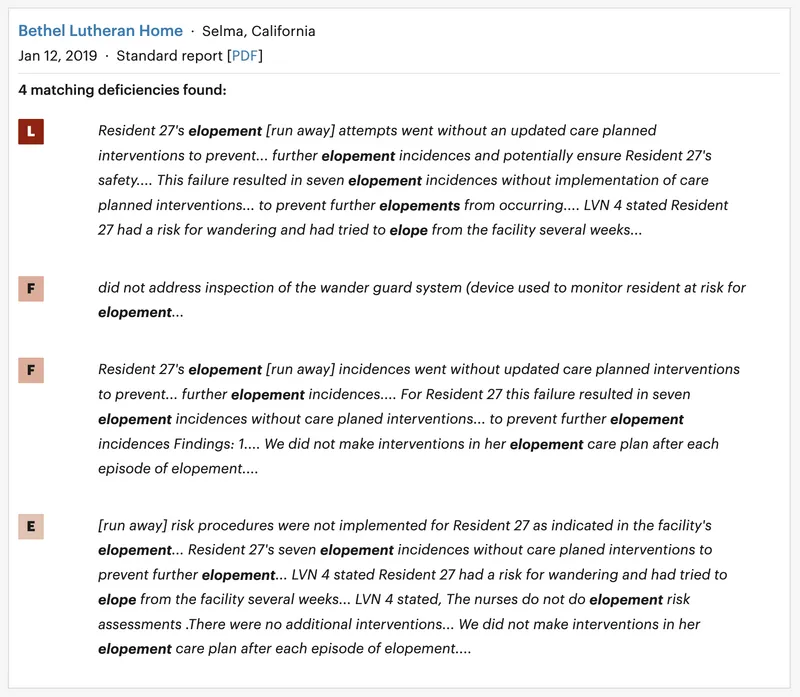
Always read the reports and understand the terms in context by clicking on the PDF link in the search results. Some reports mention the words you’re searching in the text but they don’t describe a problem at the home. The word could be in a home’s policy statement or may describe past behavior.
The reports contain a lot of jargon and sometimes don’t make clear who is at fault for a problem. Don’t make assumptions. Verify information with the nursing home’s administrator.
Additional InformationAlthough the government is reporting nursing home deficiencies online, it does not report how each home plans to fix the problems. These “Plans of Correction” can be viewed at the nursing home or by submitting a Freedom of Information request to the government.
You can always view more information by going to CMS’ own website or downloading the raw data files.
Earlier reports or unredacted reports can be requested under the Freedom of Information Act.
If you write a story using this information, come across bugs or issues, or have ideas for improvements, please let us know!
ProPublica is a nonprofit newsroom that investigates abuses of power. Sign up to receive our biggest stories as soon as they’re published.
ProPublica is a nonprofit newsroom that investigates abuses of power. Sign up to receive our biggest stories as soon as they’re published.
Charles Ornstein contributed reporting.
Charles Ornstein contributed reporting.






